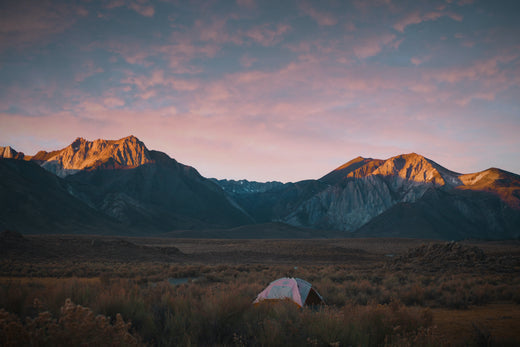Whether glamping near the breathtaking waterfalls of Ontario's Georgian Bay or setting up camp in Saskatchewan's Grasslands National Park, it is possible to stick to a healthy eating regimen. You might, however, need to be flexible based on what you bring with you and what is available where you camp. Consider this a way to try some new food ideas during your adventure.

1. Plan Recipes Ahead of Time
Decide what you will be eating for each meal and for snacks during your camping trip. Check out some recipes for nutritious meals - your dietitian or nutritionist can help - and make a shopping list. Whip up some energy snacks before you leave or make some along the way. Pack up some homemade pancake mixes, granola bars, muffins, cooked pasta, boiled eggs, grain crackers, etc. Planning ahead will make mealtime easier and more fun.
2. Bring Healthy Food for the Campfire
Kabobs are always kind of fun, and they are one of the simplest healthy foods you can cook on a camping trip. Veggies are a common choice and can be made to order for each person on the trip. Pieces of salmon or canned chicken can be added. Sweet potatoes can be roasted over a grill or wrapped in foil and thrown into the fire. Even scrambled eggs and tofu can be cooked over a campfire.
Exciting and tasty meals are possible, even when being cooked over a campfire. Let your body guide your food choices as you experience new adventures.
3. Practice Mindfulness
If you see a camping trip as a means to pounding the s'mores, take a step back. You can still enjoy these campfire favourites even when keeping to your healthy eating routine. This will be the perfect opportunity to practice mindfulness and moderation as you experience each flavour in the gooey, heavenly concoction.
Engage all your senses as you bite into deliciousness. Hear the campfire crackle in the background. See the treat you are about to indulge in. Touch the rough graham crackers to your lips. Smell the melting chocolate. Taste the sweetness of the melted marshmallow on your tongue as you feel it stick to the side of your mouth and chin.
4. Fill Your Pockets With Goodness
Hiking can use up your energy so make sure you have healthy snacks handy for when you feel that drag setting in. Some high energy snacks that will fit conveniently in a pocket and give you a pick-me-up include:
- Dried or fresh fruit -The kind of fruit is up to you, but dried is usually easier to carry and store.
- Trail mix - This can be custom-made with healthy tidbits of your choosing and stored in baggies to keep in your pockets or backpack.
- Roasted Legumes - This high-fibre, high-protein snack will sustain you throughout your journey. It's easy to make some ahead of time at home by roasting chickpeas.
- Gluten-free energy bites - This healthy cookie dough snack made of oatmeal, peanut butter, chocolate chips, and other goodies is a great source of energy. They are easy to make and to stash for hikes along your trip.
- Energy bars - They are useful and easy to carry. Read the label before counting on these, as they can be misleading when it comes to really being a healthy snack.
5. Sprinkle Seeds on Your Meals
Almost any meal can be healthier with a sprinkling of seeds that complement the other flavours. Many a dietitian suggests improving even already balanced meals with your choice of seeds. Whole or ground up, your recipes will take on a new pizazz and add some nutritional value including healthy fats like omega-3 fatty acids. Sunflower and pumpkin seeds are tasty by themselves or mixed in with other healthy goodies for the go-to of many campers - trail mix.

Bonus Tip: Do a Practice Run
Before you take off on your camping adventure, spend a night or two under the stars in your backyard, with or without a tent. Practice cooking healthy meals on your barbecue or fire pit without the accoutrements or additives from your kitchen. Make sure your meals are simple, fun and nutritious. See how you feel after snacking on some dried cherries and unsalted sunflower seeds.
Happy healthy camping! You got this!
-
This article was written by the nutritionists and dietitians of TeamNutrition. Their team offers nutrition counselling online and in over 80 locations across Canada.
For more snack ideas and tasty recipes or to learn more about healthy eating while travelling, visit their KoalaPro Premium online portal or book an appointment with a registered dietitian.





